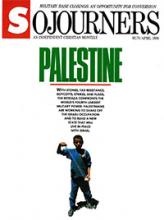John Hockenberry, Jerusalem correspondent for National Public Radio, tells of an interview he conducted with three teenage Palestinians in the West Bank town of Ramallah. He asked them what they want to do when they grow up. The first replied, "I want to be the first woman president of Palestine." The second wanted to be an engineer; the third, a surgeon.
When Hockenberry asked his driver, a middle-aged Muslim man, what he thought about these young women's aspirations, the driver said with a smile, "Since the intifada everything has changed. Everything!"
It is a new day. After years of political deadlock, there is now considerable movement on all sides of the Israeli-Palestinian conflict. The sharp rhetoric and intransigent positions so characteristic of this tragic confrontation have given way in some quarters to more moderate, accommodating positions that call for a negotiated settlement.
Most Middle East observers believe that 1989 will be a critical year in the elusive search for justice and peace in the Middle East. Without question, various religious and ethnic groups -- both in the Middle East and in the West -- will watch closely and seek to influence the course of events during the coming weeks and months.
Read the Full Article

